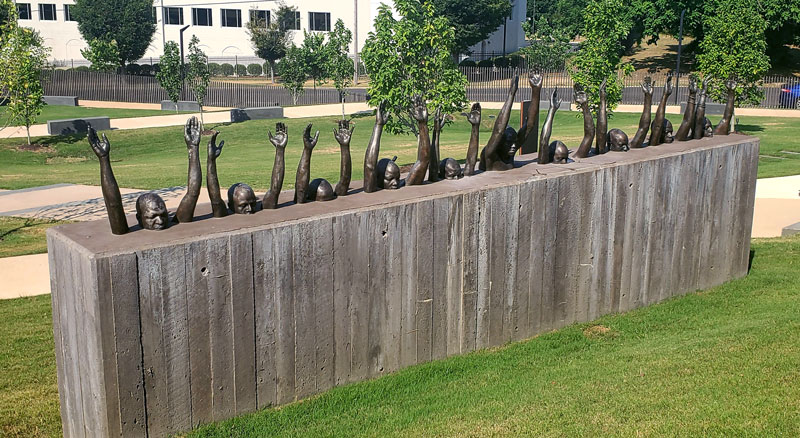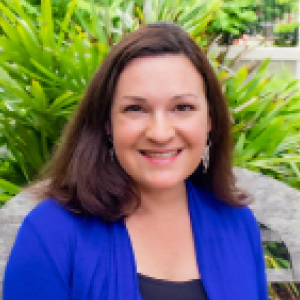The Presidents’ Forum on Racial Equity in Philanthropy and the Imperative of Leadership


On a hot, humid Alabama day in June 2019, 11 of the most influential men and women in U.S. philanthropy walked across a rolling field to witness firsthand a memorial to some of the most brutal moments in our nation’s history.
These foundation presidents and CEOs were gathered in Montgomery for the Presidents’ Forum on Racial Equity in Philanthropy, and they were visiting the National Memorial to Peace and Justice — also known as The Lynching Memorial.
It’s not exactly what most people would consider a stereotypical day in the life of a philanthropy executive, but it’s emblematic of a commitment these leaders have made as Forum participants: to learn more about the history of racial inequity and the current state of racial injustice and to take that knowledge and apply it in their grantmaking practices.
The Presidents’ Forum was launched in 2018 as a complementary program to Inclusion, Diversity and Equity in Environmental Philanthropy (InDEEP), which began in 2016 as a way to engage foundation staff at all levels at in-person and distance-learning sessions.


While InDEEP invites program and other foundation staff to participate, including senior leaders, its primary audience is engaged at the program level. The imperative for senior executive level staff — foundation presidents, executive directors, and chief executive officers — to engage in a field-building initiative to center racial equity in philanthropy emerged in part as a result of InDEEP’s initial evaluation findings, and the Presidents’ Forum on Racial Equity in Philanthropy was launched.
The goal of the Presidents’ Forum is to create a space where CEOs can candidly discuss the most difficult issues and trade-offs around equity and think through these important issues with others facing the same or similar questions. Executives have opportunities to deepen their commitments to internal organizational change processes relevant to racial equity in their organizations.
“The initiative brings together foundation leaders to bridge the gap between intention and opportunity for underrepresented racial and ethnic groups … and to develop goals that have supporting concrete action steps.”
The initiative brings together foundation leaders to bridge the gap between intention and opportunity for underrepresented racial and ethnic groups, to reflect on who they trust and how they formally and informally allocate power, and to develop goals that have supporting concrete action steps.
During the first two quarters of 2018, more than 30 foundation presidents shared their experiences and perspectives around racial equity and the philanthropic leadership imperative through a series of individual interviews with Keecha Harris and Associates (KHA).
These interviews surfaced four key areas that informed the initial dialogue around racial equity: organizational change, challenges faced, promising practices, and anticipatory guidance.
An additional set of interviews is currently underway. This data informed the development of the in-person convenings, the first of which was launched in December 2018 followed by three additional events in 2019.
A major highlight for the initiative in 2019 was the in-person convening held in Montgomery, Alabama at the Equal Justice Initiative’s Legacy Museum, a space that captures the arc of U.S. history from enslavement through mass incarceration and is located in a former warehouse that housed enslaved people.
Foundation presidents also spent time at the National Memorial for Peace and Justice (the Memorial), which honors the victims of lynching in the U.S. and has been called “a sacred space for truth-telling and reflection about racial terror in America and its legacy.”


Presidents’ Forum participants explored both sites, observing the sculpture, video, and exhibits that are designed to immerse visitors in the sights and sounds of the domestic slave trade, the Jim Crow South, and the current-day mass incarceration of people of color. Walking through the quiet lanes of the Memorial, they viewed hanging steel reminders and read the names of thousands of black men, women, and youth lost to racial violence and inequities in America. Leaving the Memorial, one by one, the poet Elizabeth Alexander’s Invocation bid them farewell.
Reflections from participants included feeling “soul-crushed and really angry at the level of hatred and the capacity of human beings to destroy each other.” Another attendee said, “I don’t fully understand white supremacy and don’t fully know how to combat it or its roles in systems and laws that result in the policies. Telling history and ripping the veil off of white supremacy is key.”
The Memorial evoked another feeling in one participant, who said, “The commemoration of these people’s lives had the ability to give hope…. It is a discipline that does not allow our humanity to atrophy. Something in our human spirit … and allowing it to transform us. I refuse to let the hope of those lives go.”
This half-day experience concluded with a facilitated opportunity for participants to share their initial thoughts and observations with the larger group, culminating in a somber and candid reflection about the tragic history and current-day reality of racial inequities in our country.
At the end of the Forum, participants expressed appreciation for connecting with their peers, deepening their own racial equity learning, and working on issues they face in their organizations in a unique historical city and with peers who are facing similar challenges. One participant said, “The direct experience of visiting the memorial and being in guided conversation was powerful.”
In the report-out of the conversation, one member said, “…it weighs heavily — the responsibility of leading — having clarity on DEI for where the organization is going…. There is no craft that we are exposed to showing us how to do so, without causing damage.”
“…it weighs heavily — the responsibility of leading — having clarity on DEI for where the organization is going…. There is no craft that we are exposed to showing us how to do so, without causing damage.”
Another president stated, “Sometimes we backpedal to find common ground; going fast and going slow is needed. Or sometimes you have to ask, ‘Do we need to do different kinds of work altogether?’”
One comment summed up the challenge of the racial equity leadership imperative: “What does leading the right-sized racial equity process look like? Staging matters — the pace and the depth. We need to define the depth of work and results.”
Eleven themes have emerged as central to engaging as a racial equity leader and advocate:
Since its inception, the Presidents’ Forum has brought together 27 foundation presidents, representing around $47 billion in assets. The initiative is led by Keecha Harris and Associates, a firm that convenes field-building offerings spanning $211 billion (23.75%) of the $890 billion in US-based philanthropic assets. KHA worked closely with Larry Kramer, President and Chief Executive Officer (CEO) of the William and Flora Hewlett Foundation, and partner firm Ali Webb Strategies in shaping the Forum and its first session.
The final 2019 convening of the Forum will be held in collaboration with partner organization Independent Sector’s annual Upswell event on November 12 in Chicago and will continue to push the boundaries of leadership for racial equity for participants through meeting together in a peer-to-peer, facilitated dialogue.
In 2020, the Presidents’ Forum will offer a tailored curriculum for new and previous Forum attendees that illustrates the craft of centering equity in philanthropy through in-person 1.5-day convenings, to include organizational DEI/racial equity profile development and design (or re-design) and an understanding of critical race theory. Each convening will offer an experiential learning opportunity at a venue of historical racial significance. The 2020 events will be held on February 11–12 in San Diego and June 8–9 at a location to be determined.
Additionally, the Presidents’ Forum hosts webinars and “Let’s Talk!”, an exclusive live video conference with Forum Director and KHA President Keecha Harris and foundation presidents. The schedule for the Presidents’ Forum 2020 webinar and videoconference series is under development and will be available later this fall.
